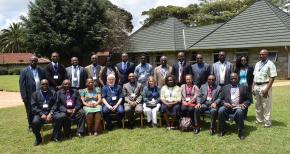Mission - African Churches Assets Programme (ACAP)
Moderator
Prof. William O. Ogara
Description
The African Church Assets Programme (ACAP) is initiated and undertaken in collaboration with the All African Conference of Churches (AACC) and with the support of Brot für die Welt to support churches and Church-Related Organizations in Africa through training, preparation of inventories and action plans and provision of resources to improve the management of their assets (land, properties and other assets) and thereby strengthen their institutional sustainability.
Goals
This workgroup has been set up for the sharing of resources and exchange of ideas, action plans and practices. This workgroup is a platform for exchange, communication and discussion between all participants of the ACAP programme.
Working Methods
Consultation and information sharing, through the online workgroup, during the workshops and email exchange and phone calls, one-on-one advice and consultancy in the development and implementation of the action plans and training and education
Language(s)
English. For other languages, contact the moderator.
Participants
Representatives of African Church institutions and Church Related Organisations
Milestones
During ACAP I (October 2015 to March 2016) 16 church institutions worked on the identification of tasks and actions to improve their records, mapping of assets and management skills in order to build practical capacity in a climate of strong accountability and transparency.
For ACAP II (November 2016 to April 2018), Globethics, in cooperation with AACC, further pursued the goal of development and capacity building with the goal of qualifying churches and Church-Related organizations for responsible asset management, strengthening the sustainability of selected participants.
ACAP III: This phase will focus on orientation and capacity building around what ethical investments are, identification of church funds that are available for investment and of church projects that would have potential for and be attractive to external investors. Churches and CROs will be enabled to take the steps needed to ensure that their own offers for investors are robust and compliant with reporting and accountancy standards and to build and develop ethical investments portfolios that are diversified.
Further information

